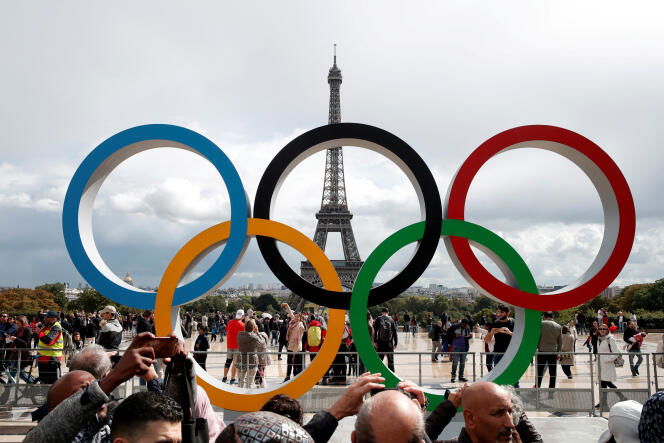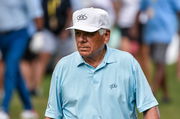
Reuters
FILE PHOTO: Olympic rings to celebrate the IOC official announcement that Paris won the 2024 Olympic bid are seen in front of the Eiffel Tower at the Trocadero square in Paris, France, September 16, 2017. REUTERS/Benoit Tessier/File Photo

Reuters
FILE PHOTO: Olympic rings to celebrate the IOC official announcement that Paris won the 2024 Olympic bid are seen in front of the Eiffel Tower at the Trocadero square in Paris, France, September 16, 2017. REUTERS/Benoit Tessier/File Photo
Paris, the culinary capital of the world, promised a gastronomic feast for its Olympic athletes, with visions of 13 million meals prepared by 200 chefs, featuring 500 diverse recipes showcasing French terroir and international flavors. Michelin-starred chefs like Amandine Chaignot, Alexandre Mazzia, and Akrame Benallal were enlisted to create signature dishes in the Paris Olympics, highlighting locally sourced, sustainable ingredients with a focus on athlete nutrition. Yet these grand promises quickly soured.
Watch What’s Trending Now!
Instead, the Olympic Village has devolved into a scene of culinary chaos, with reports of undercooked meat, meager portions, and long queues. The ambitious vision of “most sustainable Games” with 20% organic ingredients and a reduced carbon footprint has been overshadowed by the reality of hungry athletes boycotting the dining halls. Team GB athletes have resorted to bringing packed lunches back to the village to ensure a more nutritious evening meal. Reports indicate that athletes are boycotting several dining options, dealing with supply shortages, and, more recently, troublingly, undercooked food. It appears that the Olympic Village’s dining experience is not quite up to snuff for these 10,000 high-performance athletes, and the dire situation has left many questioning the organizers’ ability to meet the basic needs of these high-performance athletes.
As Andy Anson, the British Olympic Association’s chief executive, lamented to The Times, “At the beginning of every Games there are usually two or three issues and the transportation is always one.” Anson noted, “but the big one this time is the food in the village, which is not adequate… There are not enough of certain foods: eggs, chicken, certain carbohydrates. And then there is the quality of the food, with raw meat being served to athletes.” In response, Team GB has brought in their own chef to the Paris Olympics to cater to their athletes’ needs at their Clichy performance lodge, a desperate attempt to salvage their athletes’ nutritional intake and performance potential. This proactive measure speaks volumes about the severity of the situation and the lack of confidence in the official catering.
ADVERTISEMENT
View this post on Instagram
Team GB officials are resolute, refusing to compromise on their athletes’ health amid this culinary debacle. To address the dining challenges at the Olympic Village, Team GB had the idea to bring in their new chef to enhance catering at their performance lodge, “Clichy.” Located about 4 kilometers away in northern Paris, Clichy is a 15-minute drive or a 45-minute walk from the Athletes’ Village. With this, many athletes have opted to dine at Clichy instead of relying on the village offerings, seeking a more satisfactory culinary experience. But even with these efforts, the damage to the reputation of the Paris Olympics’ culinary offerings may already be done.
The stark contrast between the gourmet promises and the grim reality has ignited a social media firestorm, with fans expressing shock and disgust at the unappetizing and potentially dangerous conditions. The athletes, who require specific nutritional regimens to fuel their demanding training and competition schedules, are being met with shortages of essential protein sources like eggs and chicken, as confirmed by a Sodexo Live spokesperson to L’Equipe. Far from the vibrant culinary journey promised by organizers, athletes are facing the grim prospect of foodborne illnesses due to undercooked meat, a far cry from the innovative lentil dal and langoustine bisque envisioned by the acclaimed chefs. The internet is ablaze with criticism, memes, and calls for action as the world watches this culinary catastrophe unfold.
ADVERTISEMENT
Haute Cuisine? More like ‘Haute Mess’ — Olympic Village food sparks global outrage
“Wtf is that, I’d rather die that eat that stuff,” one disgusted fan commented online, echoing the sentiments of many athletes who are finding the Olympic Village’s culinary offerings inedible. With rigorous training and competition schedules demanding peak physical conditions, athletes rely on proper nutrition, especially sufficient protein, to fuel their performance. Organizers’ initial estimates for food supply have proven woefully inadequate, leading to shortages of essential protein sources like eggs and meat, leaving both vegetarian and omnivorous athletes struggling to meet their dietary needs. But it’s not just about quantity; the quality, or lack thereof, is raising serious alarms.
ADVERTISEMENT
The discovery of raw meat being served has ignited fears of foodborne illnesses, putting athletes’ health at risk. Reports from the NSW Food Authority detail the potential presence of harmful bacteria like Salmonella, Listeria, Campylobacter, and E. coli in undercooked meat, a dangerous gamble for athletes who can’t afford to fall ill during this crucial time.
This dire situation has prompted drastic measures, with Team GB leading the charge. As one observer wryly noted, “You know it’s bad when the Brits start bringing in British food and British chefs.” Indeed, the British delegation, unwilling to compromise their athletes’ well-being, has flown in their own culinary reinforcements. Athletes are now reportedly skipping the village’s dining halls, opting for packed meals from their own performance lodge to ensure they receive the nutrition they need. This culinary crisis is further compounded by logistical challenges.
Top Stories
NFL Suspends Chargers’ Denzel Perryman for Two Games Over Cowboys Incident

Clark Hunt Admits Being Pressured to Leave Arrowhead After Chiefs Offered $2.4B Proposal

Lee Trevino, 86, Leaves Golf World Hanging on Every Word at PNC: ‘I’ve Been Digging Worms’

Steelers Confirm $45M Punishment for DK Metcalf After NFL Suspended WR for 2-Games

Sean McDermott Confirms if Bills Will Sign a QB Amid Josh Allen’s Injury Concerns

Trent Williams Announces Retirement Plans After 49ers Clinch Playoff With Win vs Colts

ADVERTISEMENT

ADVERTISEMENT
With accommodations spread across the suburbs of Saint-Denis, Saint-Ouen, and Lile-Saint-Denis, they have had around 4,250 athletes expected during the Olympics and 8,000 during the Paralympics. Olympic officials had previously claimed that about 40,000 meals would be prepared daily in the village. However, the largest restaurant venue reportedly seats only 3,300 people. The irony of Paris, a city renowned for its gastronomy, facing such condemnation for its food hasn’t been lost on social media, with one user commenting, “Ironic of lifetime – paris being condemned for food 😅🤣 I guess it was about time.” This food fiasco is just the latest in a string of controversies plaguing the Paris Olympics.
“Isn’t France a first world country first athletes complaints about bed and mattress, then Brazilian athelete robbed, and now food,” questioned another frustrated observer. Indeed, the Games have been marred by complaints about uncomfortable cardboard beds, a high-profile robbery targeting a Brazilian football legend, and now this culinary debacle.
The cardboard beds, designed with eco-friendliness in mind, have been criticized by several athletes, including Simone Biles, Matilda Kearns, and Tom Daley, for their lack of comfort. Then, on July 25, 2024, Brazilian football icon Zico fell victim to a brazen robbery, losing over $500,000 in valuables snatched from a taxi. Now, the food controversy has taken center stage, further tarnishing the image of these Games.

With the British, known for their typically reserved palates, voicing their discontent, the severity of the situation becomes undeniable. “If Britain is complaining, you know the food must be REALLY bad,” quipped one commenter. This echoes a similar food safety scandal that rocked the 2008 Beijing Olympics, where melamine-tainted dairy products led to widespread illness and even fatalities.
The specter of that scandal looms large as athletes grapple with the current crisis. Remember Usain Bolt’s reliance on McDonald’s Chicken McNuggets during the 2008 Games? To avoid potential health risks, Bolt consumed those chicken McNuggets during his ten-day stay in China, averaging 100 nuggets a day. His dietary choice was driven by a desire to avoid upsetting his stomach with unfamiliar local food. Despite these concerns, Bolt triumphed at the Olympics, winning two gold medals and setting world records in the 100m, 200m, and 4x100m relay. This desperate measure to avoid potential contamination serves as a stark reminder of the risks athletes face when food safety is compromised.
Now, the question remains: Can the Paris Olympics overcome this latest hurdle and salvage its reputation? The world is watching, eager to see if the organizers can rise to the challenge and ensure that the athletes receive the nourishment they need to compete at their best.
ADVERTISEMENT
ADVERTISEMENT
ADVERTISEMENT

